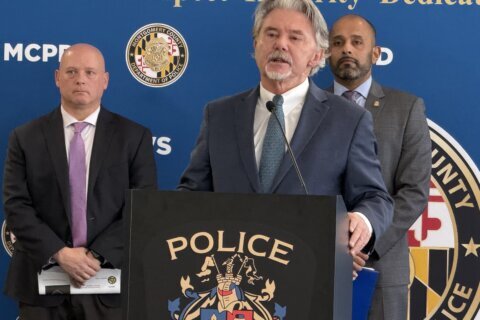There will be family celebrations, as always, but there will also be serious conversations taking place this Father’s Day.
The Black Lives Matter demonstrations that have spread across the globe have sparked conversations in public and in private among families — conversations about race, bias and inequality.
For Montgomery County Council member Craig Rice, the issues surrounding the protests hit close to home.
At a recent hearing, he told his fellow council members that his two teenage daughters, 13-year-old Caelyn and 17-year-old Anaiya, used to tell him: “Nobody sees race anymore.” But Rice said that suddenly stopped.
Noting the current climate, Rice said, “we’ve now broken the spirit of a generation that actually thought we were on the right track.”
In an interview this week, Rice talked more about the role of Black fathers, how they’re portrayed, and what he hopes for the futures of all three of his children.
Rice, who lives in upper Montgomery County, said discussions about race started fairly young, but it wasn’t until middle school that his own children started seeing and hearing racist remarks and attitudes. Some subtle, others, blatant.
“The reality is that they were shocked by people they know who were actually on social media, and saying the things that they were saying,” Rice said.
He explained that there would be remarks about current events and that if they were discussing something where an African American had done something wrong, his daughters would hear or see comments that suggested “folks were doing something wrong because they were Black,” as though that explained it.
Rice said every Black parent has “the talk,” — a discussion that is meant to prepare children of color that the world sees them differently — as dangerous, or a threat.
“It’s asking a lot to prepare a 12- or 13-year-old and say ‘Hey, you’re about to have this heavy conversation with someone about why you’re equal.'”
There are positive messages too, Rice said, who pointed to changes in the way Black fathers are portrayed. He’s happy to see the stereotype of absent fathers in Black families fading.
“That is not what we see in the statistics any longer,” said Rice. “And I’m happy to see that.”
Rice said shows like “Black-ish” and the Oscar-winning short film “Hair Love” show fathers in Black families more realistically.
“They’re actually showing Black families as they truly exist, with moms and dads raising their children.”
In the animated film “Hair Love,” the father of a young girl struggles to style her curls just right. The film was praised, not only for its animation, but for showing a father taking on some of the routine care of his little girl, while also cultivating pride in his daughter’s natural hair.
Like any father, Rice wants to see a brighter future for his children. He’s often tried to get them out to try all kinds of experiences, from skiing and snowboarding to traveling. He said he wanted to expose them to as many things as possible.
How come?
“So they can find out what their passion is in life and then follow it. We owe it to them to be able to provide as many of those pathways as possible,” Rice said.
In so many families, fathers get teased for their bad “Dad jokes.” In the conversation, Rice was asked if he had any. He laughed and said he’d been corrected on that score by his daughters.
“They just made it very clear,” he said, that his attempts at humor would get a veto from them.
“Dad’s thing is driving them crazy,” he said with a laugh.







